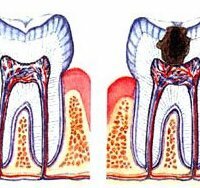What can lead to deep caries?

Although many believe that tooth decay is a simple disease, in fact it is an insidious, complex and dangerous disease. If the treatment is not performed in a timely manner, the disease can lead to a complete loss of teeth. Initially, damaging the enamel of the tooth, caries with time can penetrate deep into the dentin and eventually lead to complete destruction of the tooth. If the treatment does not start at this stage, tooth decay can penetrate deep into the tooth. Deep caries is the last, the most complicated in the treatment, stage of the development of the disease, in which all layers of dentin are affected and tooth destruction occurs.
The insidiousness of caries is that at the initial stage it does not cause any anxiety in a person, and when there is a toothache and a person realizes that it's time to go to the dentist - most often the disease is already in an advanced stage, in which treatment is much more difficult, Than at the initial.
Also, the insidiousness of this disease manifests itself in the fact that he has virtually no symptoms on which his appearance could be traced. Very often a person may not even suspect that he has caries. At the initial stage, the disease can only be detected by an experienced dentist. That is why it is strictly recommended to visit the dentist at least 1-3 times a year and follow all his recommendations unswervingly.
However, deep caries can lead not only to tooth loss. Everything is much more serious and complicated. If the treatment is not performed in time, then the appearance of such effects of caries as periodontitis and pulpitis may occur. Pulpitis is an inflammatory process of the pulp of the tooth, in which the patient experiences acute pain. Periodontitis is also an inflammatory disease requiring long and complex treatment.
Acute and neglected forms of caries can cause inflammation of the soft tissues of the gums, as well as in individual cases and faces. As a result, the person is swollen not only with gums, but even with cheeks.
If the caries treatment is not carried out at all, the main source of danger is that the area affected by caries is a hotbed of infection in the patient's body, which can lead to such consequences as the development of inflammatory processes in the joints and the appearance of cardiovascular diseases. It is clear that this prospect looks rather frightening and the best way out will not be to postpone the visit to the dentist.
However, all of the above - not the entire list of consequences, which may lead to caries. The presence of a permanent infectious area in the mouth of a person can promote the development of various allergic reactions of a chronic nature. Often in such cases, the patient can not even understand what he's allergic to, since the body shows an allergic reaction to almost everything. And the cause of all this may be just a banal caries.
If you do not go to the dentist and do not undergo a course of treatment, over time, the caries destroys the tooth completely, which naturally has a very negative effect on the quality of the chewing process. And if the food is not chewed enough, this has the most negative effect on the activity of the gastrointestinal tract, especially if the caries has affected more than one tooth in this way, and several, and often this can lead to the appearance of diseases of the gastrointestinal tract that require medical attention.
You can also mention the aesthetic side of this phenomenon. Of course, even and white teeth look very beautiful. And if the teeth were affected by deep caries, and besides several of them were destroyed by it, then by itself, it is hardly possible to talk about a beautiful smile. As a result, a person begins to be ashamed of his smile, avoid contact with others, feel uncomfortable surrounded by a large number of people. In turn, this leads to the fact that the quality of life deteriorates, a person begins a series of depressions. So is not it better to just go to the dentist at an early stage of the disease and avoid all those unpleasant consequences that were described above?



